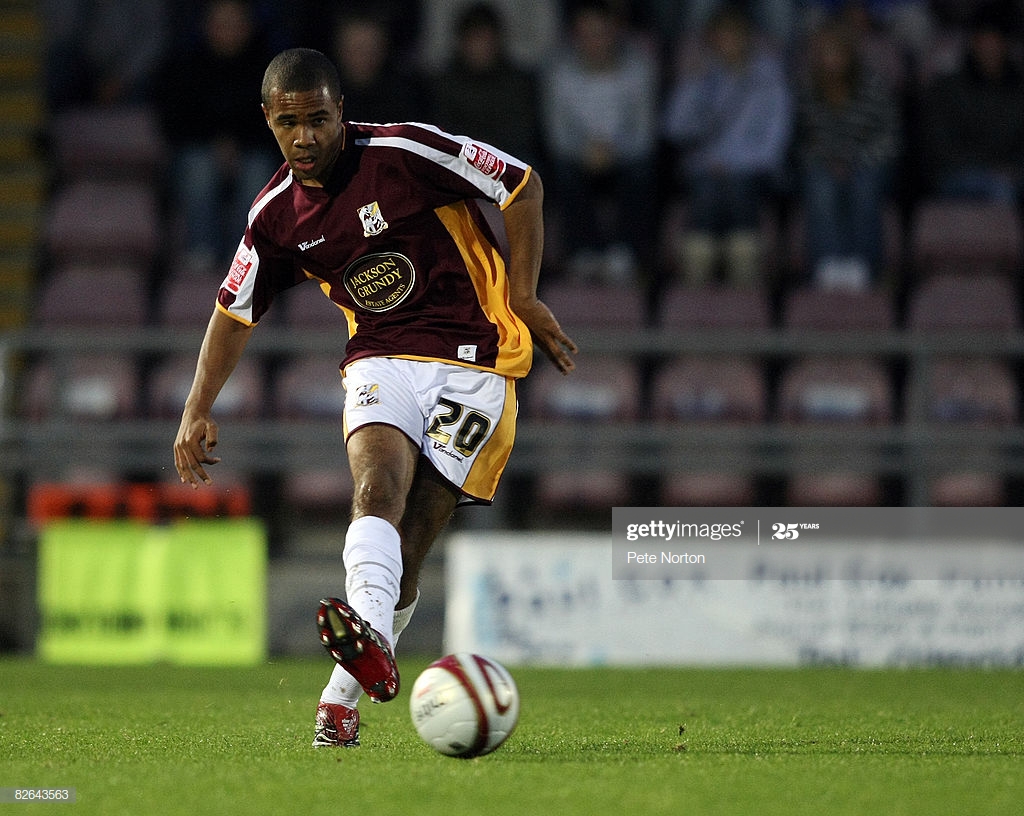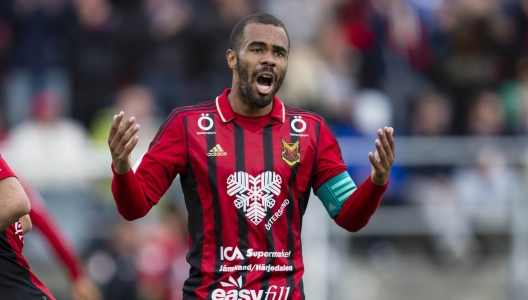This article was written in March 2019.
Alex Dyer thought his career as a professional footballer was over after his release from Northampton Town in 2010. He would spend four years out of the pro game, even completing an accountancy degree and taking up a job at a software company. However, a move to Sweden in 2014 has seen a return to the game full time where he has been one of the star men ever since.
“I really struggled to deal with it [being released] at first,” he says. “I’d had a lot of unsuccessful trials after being released which meant I was left club-less quite late on in the season, so I joined Wealdstone, who were in the Ryman Premier, a much lower league than I saw myself playing.
“I think I was a bit entitled at the time, thinking I deserved better which led to me not performing my best at the start and the adjustment period took maybe a season-and-a-half, in all honesty. It’s easy to become comfortable in the professional environment as a youngster and take things for granted.”
Having been born in Stockholm to an English father and Swedish mother, Dyer and his family moved to London when he was just six-weeks old. He remained in the capital until the age of 15 when he joined Northampton.
After just two years, he made his breakthrough into the first team, spending two seasons as a bit part player before the Cobblers suffered relegation to League Two.
“I saw it [relegation] as possibly a positive, as I hadn’t played that much that year and thought I’d probably have more chances with us going down a league. I did play more often the next year, but was still pretty much in and out, and looking back I don’t think I did enough to properly cement a place in the team.
“Manager changes made it a bit harder too.”

The midfielder made 20 league appearances in that season back in League Two but only four were starts as his side failed to earn promotion straight back to League One. At the end of that season he was released after three years of being around the first team squad and began his time playing in non-league and working on a degree. However, little did he know that three years after release that his return to education would also be his gateway to his return to pro football.
“I just accepted where I was and just started working hard – that’s when things started to change for me,” he says. “I completed an accountancy course with the Open University and ended up working for an educational software retailer in the accounts department, at first for free, then getting hired after a few weeks.
“My last season spent in Wealdstone was me working whilst playing weekends with training two evenings a week. I also represented Great Britain football team in the University Games 2013 in Kazan.
“I then left Wealdstone for Welling United that summer and decided to quit my extra job too and give football another go, given Welling trained three mornings a week instead of evenings. I spent the other days just training extra and in the gym.”
It was a successful summer for the midfielder as he was part of the GB side who earned a silver medal in Russia – they narrowly lost to France in the final after extra time. As part of a squad which also included Nottingham Forest winger Joe Lolley and MK Dons defender George Williams, Dyer had the chance to impress on a global stage and it would be from playing for his country that his opportunity abroad would arise.
After the games, he returned to England to make the aforementioned move to Conference side Welling United. After 20 league matches for them, in which he scored four goals, his old GB coach put him in touch with one of the rising stars of the Swedish game. It would give the sense of going full circle for the former Northampton man.
“The head coach for Great Britain, James Ellis was close friends with then Östersunds manager Graham Potter, having both worked together in the educational sector, and so recommended me to him as they were looking for players.
“Graham watched a few games I played in, then ended up offering me a contract. Given my close connection with Sweden, it did feel like fate that this happened, as I previously had never thought of moving there, or playing there, it really just came out of nothing.”
Potter’s story at Östersunds is a well-documented but that is for a reason. The former Stoke City player took the club from the fourth tier of Swedish football to the Europa League knockout stages with a flexible and attacking tactical approach. That led to him taking up the job at Swansea City.
Dyer joined the club in the second-tier and in his second season with the team he played a key part in their promotion to the top flight where they have remained ever since. After scoring twice in his first season, he fired eight the following campaign as Östersunds were promoted as runners-up.
“I found it so much easier playing in Östersunds than any of my clubs in England. Graham believes in a possession-based style of play and that suited me perfectly. The English game is a lot more physical and intensive, and a lot of times I found myself getting lost in games and them just passing me by, as I never got to show my strengths. In Östersunds, we always had the ball and I had a real chance to show my qualities, and I loved it.”

Despite having been playing non-league just a few years previously, Dyer was now playing in the top flight in Sweden and he took the step-up in his stride, bettering his statistics from the previous season even though he was now playing at a higher level. The 2016 season was the club’s first ever in the top division but they impressed everyone as they finished eighth in the 16 team league, with Dyer being one of their star men as he scored nine times in 26 games.
“I actually found playing in the Allsvenskan (top division) easier than playing in Superettan (second division). It feels like the higher the level, the better players and more respect shown, so the game slows down and becomes clearer.
“Of course, it can be a challenge for some as it’s much more tactical and mistakes are quickly punished, but again it plays to my strengths as I am good tactically and enjoy trying to find solutions on the pitch against better opposition. You also up your game when you know your opponents are better, so I think that factors in too.
“Swedish football as a whole is slower and more tactical than English football, the level I played anyway, and referees are a lot stricter too, so physicality doesn’t always get the chance to win through. I personally prefer it based on my playing style.”
After a superb 2016, Dyer made the decision to move on from Östersunds to join fellow top-flight side Elfsborg, a club traditionally seen as more established and who have been Swedish champions on six occasions in the past. The decision was not one the former Northampton man took lightly however, as he found it difficult to leave behind the man who he credits with saving his football career.
“A part of me never wants to allow myself to feel comfortable again and after three years I just felt like I wanted to challenge myself to adapt to a new playing style, city and club.
“It was a hugely difficult decision for me because of Graham, in particular. The culture he created at the club allowed you to be yourself, to try, fail, learn, develop, and not just as a footballer but mainly a person. If you speak to any of the teammates I had there at the time, everyone will tell you they grew as a person and player. He’s a great leader and person first, then he’s the tactical genius second, which I think is important, as in football that sometimes gets lost and you are treated as more of a product than a human being. “
The 28-year-old is now starting a new chapter in his career, having joined Norwegian side Lillestrøm on loan ahead of the 2019 season. Right now, he says he does not see himself coming back to play in England any time soon but there is one country he continues to leave Scandinavia for and that is the tiny Caribbean nation of Montserrat. The midfielder has been a full international for the country since making his debut in 2011, having qualified through his father’s parents.

Ranked 200th in the world by FIFA, the nation has never qualified for a major tournament and are mostly made up of players from the English non-league. Goalkeeper Corrin Brooks-Meade is one of the more experienced players in the side, having started his career at Fulham before playing professionally in Cyprus and Bulgaria. Despite their low standing, the creation of the CONCACAF Nations League provides Dyer and his international teammates the real chance to make North America’s Gold Cup and it is an experience he thoroughly enjoys.
“I honestly love playing with the national team,” he says. “We have a fantastic bunch of guys, and we’ve become really close through playing together. Nobody expects us to do anything, which creates a strong bond between us that will take us far. The team has improved a huge amount over the last few years and I hope we continue to do that. We have a real chance of qualifying for the Gold Cup this year and for a nation of our size, it would be a ridiculous achievement.
“We are all really hungry and ready to give everything to make that happen and make history for our nation. We have a hungry, loyal squad who will create problems for anyone.”
Dyer has come a long way from the offices of an accountancy company and his story can serve as inspiration for anyone who is looking for a second chance in the game.
2020 update: Dyer has been playing in Kuwait for Al-Tadhamon.

One reply on “Alex Dyer: From the Open University to Swedish top flight & Montserrat national team”
Reblogged this on Living on the Island of Montserrat and commented:
From the Blog – English Players Abroad